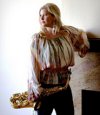| Tuesday, October 22, 2013 |  |
 |
 |
 |
 |
 |
 
 
 |
 |


 A New Breed of Indie Artists
A New Breed of Indie Artists Free Music and Programs for Radio and Podasters
Free Music and Programs for Radio and PodastersBreaking Bland
|
There's a lot of bland out there. My proximity to the radio industry and indie artists draws my awareness to it in these two disciplines, but I'm sure it exists across the board. The adjective "bland" is always a subjective call. Dictionary.com reads: 1) pleasantly gentle or agreeable 2) soothing or balmy, as air 3) nonirritating, as food or medicines 4) not highly flavored; mild; tasteless 5) lacking in special interest, liveliness, individuality |
"Think: What if a football quarterback called cadence using words instead of numbers? 'Grass' 'Lamp Post' Snap on 'Lamp Post.'" |
Bland is not necessarily negative, as #s 1, 2, and 3 show. It is also not unique, as #4 states. And #5 sums up the application of bland when it comes to what's being produced by the online radio industry. Hit songs aside, radio reflects a blandness offered by artists - as most of online radio is song-after-song-after-song programming.
I nearly always hear claims like this from an artist: "You're going to love this song" or "I only do quality music." The customary descriptions are also there when internet radio station owners submit to RadioRow. Examples:
 "This is Hard Rock the way it was meant to be played."
"This is Hard Rock the way it was meant to be played." "...always the best music"
"...always the best music" "The best in Underground Tech, Minimal and House"
"The best in Underground Tech, Minimal and House"Do those descriptions get your juices flowing? They are not unusual or offensive, but bland. (Read more on how a good description is now required.)
"Itís not just mass consumption today; itís mass competition" was a theme used earlier at AG to discuss the artistic environment. Regardless of whether you're producing a radio program or song, you'll find there is more competition - and it's more easily accessed by consumers now than at any time. As a creator, you have to deal with things in ways that are new to capture attention.
Think: What if a football quarterback called cadence using words instead of numbers?
"Grass"
"Lamp Post"
Snap on "Lamp Post." Changing how things are done is what I refer to as "doing different," or breaking bland. We don't have enough of it today.
Take what we have, look at what others are doing with it, and make something that doesn't exist. Business has been calling this "filling the void" for decades. The radio industry used to do it, regularly. In music, it was happening between the mid-60s and late-70s. Each group was out to be bigger than life by creating something that didn't exist. (Important: Fans also had limited choice - which is another article.)
Today content is too formulaic. Safe. Bland.
From songs received at RRadio Music I can tell there's talent out there, but many artists need a push to excel. A lot of what's submitted lacks the "wow" factor.
From radio stations I listen to when searching to add to RadioRow.com, I see there's little experimentation in programming. Stations exist in a state of blandness that's duplicated ad nauseam. Where is "breaking bland" in radio?
Capturing the attention of an audience is the point at which you need to make them want to come back.
Breaking bland is hard. Being average is easy. The choice is yours. I'm for the former.
Today's indie artist introduction is to...
| Pop artist Dolly Rappaport |
 sample song |
Am I Dreamin'? Download Song
|
Give Dolly Rappaport's "Am I Dreamin'?" a listen.
Add it to your playlist, free! Such is the new world of music distribution.
It's time internet radio programmers reach into a huge pile of untapped talent.
It is here where new hit songs will increasingly be found.
More Articles
 |
 |
 |
comments by Disqus |



